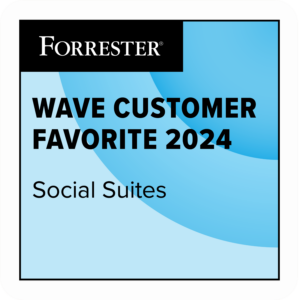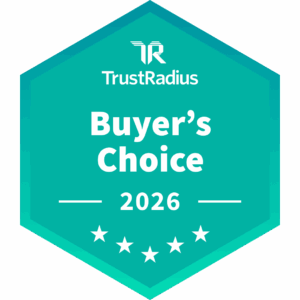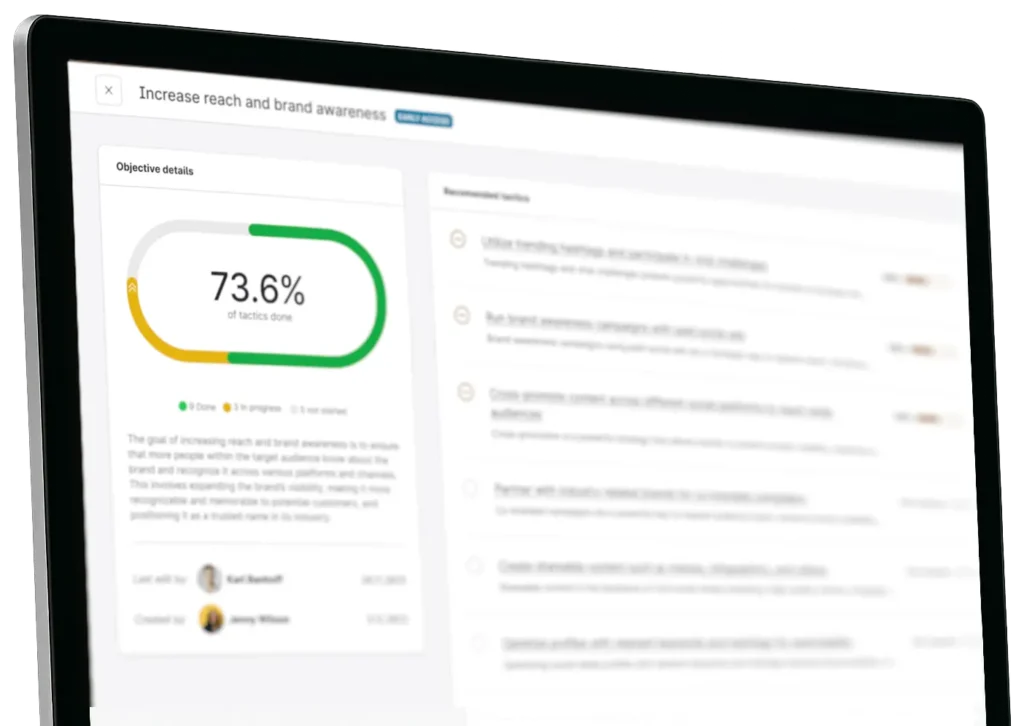If you’re not turning Instagram, Facebook, and TikTok into direct sales platforms with social commerce, you’re leaving cold, hard cash on the table.
Your customers are already there – and many of them want to shop. About half of users say they’ve made purchases directly from social media within the past 90 days.
In this article, we explore everything from the definition of social commerce to how top platforms currently support it.
What is social commerce?
Social commerce, otherwise known as social shopping or social media shopping, is the use of social media to sell products directly to consumers. By definition, social commerce is a type of eCommerce. However, there’s a key difference between true social commerce and other types of eCommerce.
- In traditional eCommerce, retailers sell products on their own apps and websites. They may advertise items on social media, but shoppers have to click through to the retailer’s online store to investigate and buy a product.
- In social commerce, retailers sell products on social media networks. Consumers can discover and purchase products entirely within the platform, mid-scroll.
Social commerce is also not the same as social media marketing – though they may be besties. If you’re using social media to promote your brand, that’s marketing. However, the goal of social commerce is to sell products directly on social media platforms.
If your brand has built up a following on social media, social shopping allows you to monetize your pre-existing audience. If you’re in the earlier stages of building a social presence, your audience and your social commerce activities can grow in tandem.
How does social commerce work?
Brands can set up shoppable storefronts on platforms like Instagram, Facebook, Pinterest, and TikTok, allowing customers to discover, browse, and purchase products without leaving the app.
Social commerce features such as product tags, shoppable posts, and in-app checkout streamline the buying process, reducing friction and increasing conversion rates.
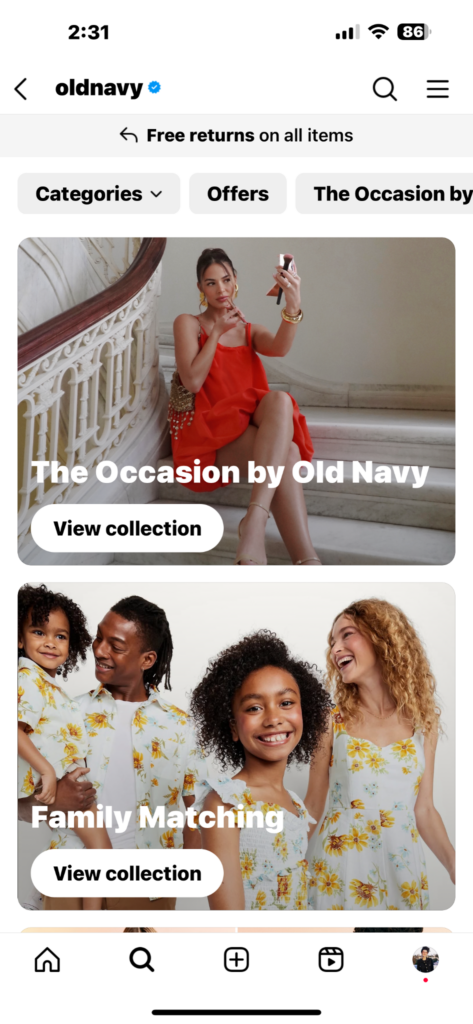
To see social commerce in action, let’s take a look at Old Navy’s Instagram shop. Through its in-app store, Old Navy can centralize and manage the social shopping experience.
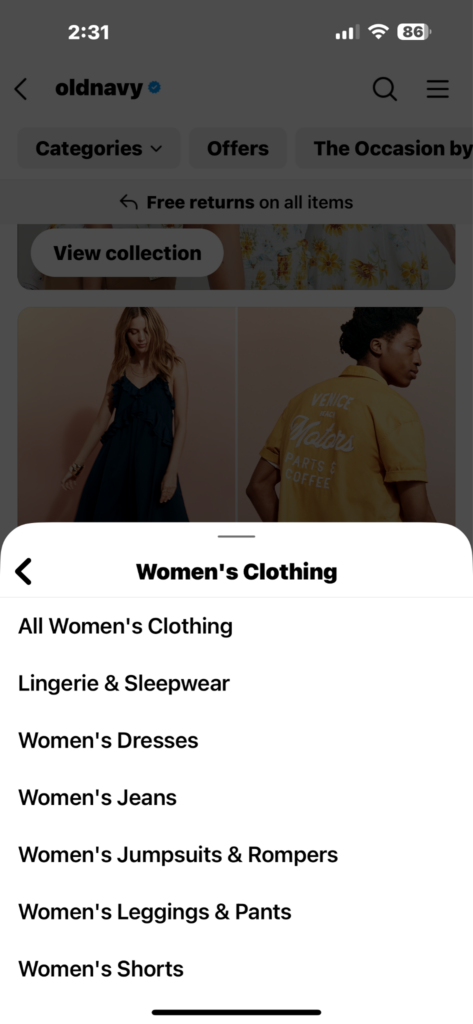
Potential customers can click on links in Stories or Highlights to access the shop and browse product collections on various themes, such as women’s denim. There, they can click on images to see more details and make a purchase.
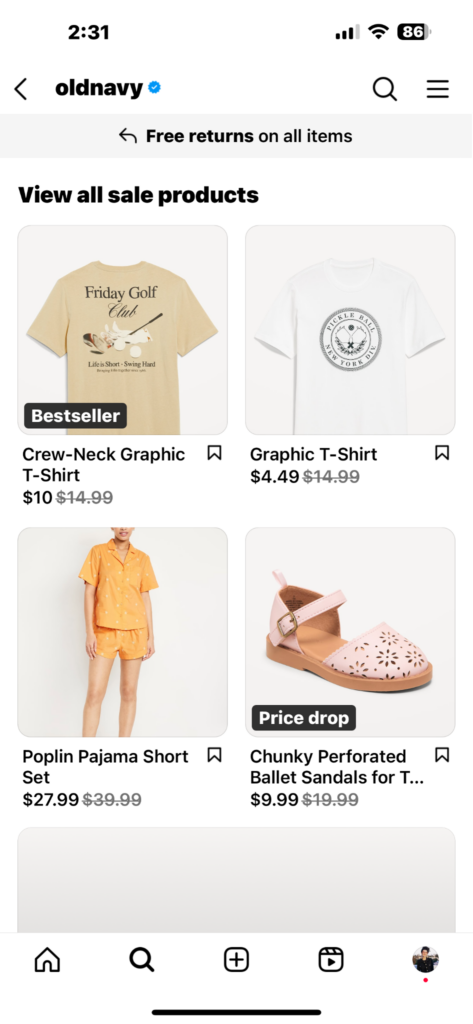
Why is social commerce important for brands?
The outlook is bright for social shopping. By the end of 2026, social commerce sales are expected to surpass $100 billion for the first time. The seamless integration of shopping into the social media experience can clearly be extremely beneficial for brands.
What does embracing social commerce allow brands to do?
Let’s discuss just a few of the advantages:
Sell to consumers where they are
Almost half of consumers use social media to research and compare products they want to buy. That means social shopping is a part of their normal scrolling behavior. By having a social commerce presence and posting shoppable content, your brand meets them where they hang out.
Make sales fast and seamless
Social commerce eliminates extra steps for shoppers. It removes barriers, such as having to navigate to your website to make a purchase, that could prevent them from buying your product right then and there. As a result, consumers are less likely to hesitate before making a purchase and are less likely to abandon the transaction before completing it.
Drive sales through personalization
As marketers know, social media platforms supercharge your ability to target niche audiences and deliver hyper-personalized messaging to individual consumers. With social commerce, you can utilize these capabilities to reach the exact right shoppers and generate direct sales.
What kind of products sell the best on social media?
Many different types of consumer products can benefit from social commerce.
What products are the best fit?
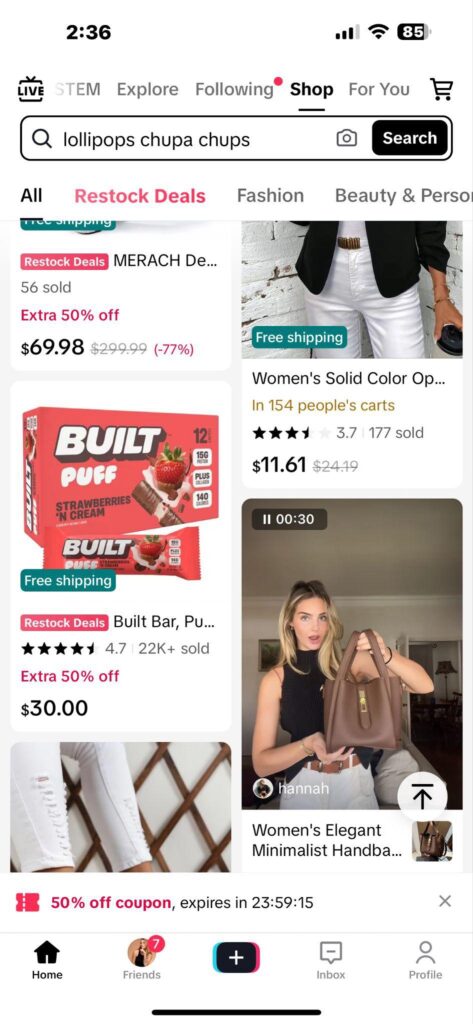
- Apparel and accessories lead the way. Consumers love purchasing these on social media.
- Beauty and personal care, home decor and furniture, food and beverage, and electronics are the next most successful categories when it comes to social selling.
- Social commerce works well for new and unique products, as well as those featuring aspirational imagery. Include posts highlighting what makes these products fun and different in your overall social strategy. Give buyers a clear, simple value proposition to help drive impulse purchases.
- Social commerce is well-suited to products aimed at young consumers, such as millennials and Generation Z, who are more likely than older generations to shop on social media.
How to avoid the 3 biggest social commerce mistakes
A successful social commerce program can deliver enormous benefits when properly implemented. But if you don’t overcome the most common challenges, your efforts might fall flat.
Let’s explore the most common roadblocks to social commerce success and how to avoid them.
Mistake 1: Using a one-size-fits-all approach across platforms
Knowing your audience and your market is key. Younger shoppers tend to spend more time on social media and may be more eager than older age groups to buy products on social networking platforms. However, different things motivate different demographics to make a purchase.
Solution: Cater to different shopping preferences. Think about your ideal customer and where they spend the most time, and ensure that your shop is targeted to them on the right platform.
Consider the following data:
- Gen Z (53%) and Millennials (56%) are the leaders in social commerce adoption. If you’re targeting these demographics, be sure your social commerce program is sophisticated and responsive, because that’s what they expect.
- Boomers are more influenced by discounts (60%) and reviews (55%). Integrate these into your social commerce shop to drive purchases from this group.
- UGC drives purchases for all generations (65%), but younger audiences are also swayed by humor and relatability. Consider your tone on platforms that cater to younger shoppers, like TikTok and Instagram.
- Frequent social shoppers are more active on Instagram (69%) and TikTok (61%), which also corresponds with the highest numbers of Millennial and Gen Z users. If you’re just starting out with social commerce, one of these two platforms will be a good proving ground.
Mistake 2: Not tracking inventory across platforms
If you’re setting up a social commerce shop on one platform, you’re likely also selling across several other platforms, including traditional eCommerce.
If you don’t have a unified inventory system, you could be offering products on your social shops that aren’t actually available at the time of purchase, leading to disappointed and frustrated customers.
Solution: Synchronize inventory with automated updates. Ensure that your inventory tracking system includes all sales platforms and that your customer service team can access this information. If an item is low in stock or sells out, you’ll want that to automatically update across your social shops.
Mistake 3: Ignoring comments or messages about the shopping experience
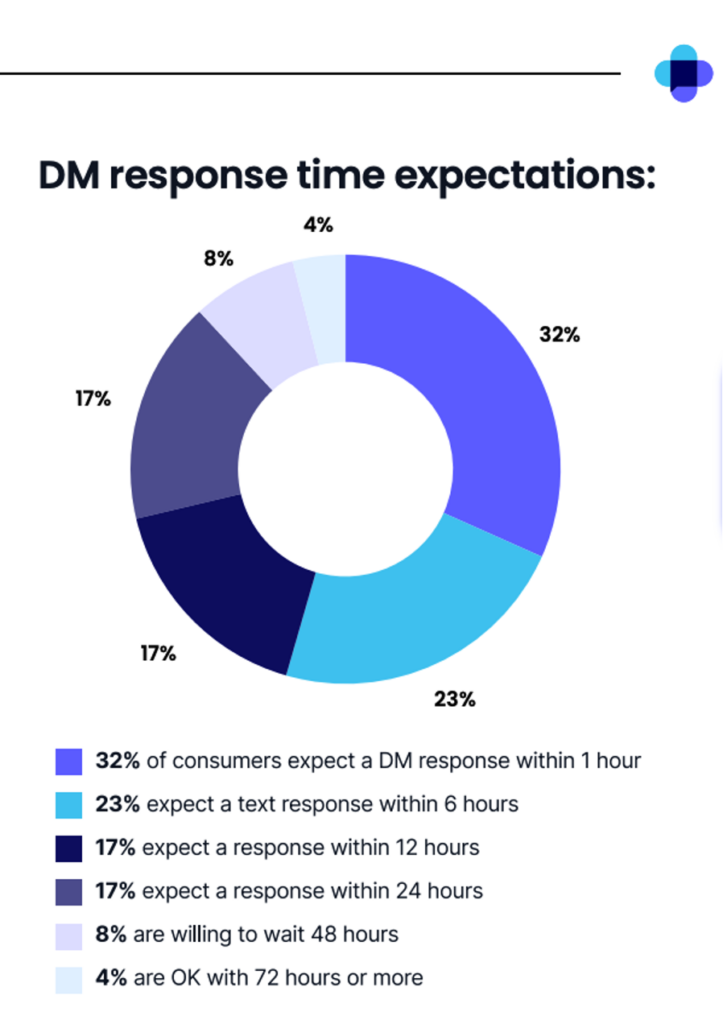
When it comes to social media engagement, it’s easy to respond to comments offering praise and support for your brand. But if you don’t also answer thornier, more tactical questions promptly and with a clear explanation, you risk losing social commerce sales.
For example, a customer might comment on a post, “Why can’t I complete my purchase for this bracelet?! So frustrating!” That’s an opportunity to save a sale, create a repeat customer, and protect your brand’s reputation, if handled correctly.
Solution: Use social listening tools to ensure you never miss a social commerce comment or DM. Even the most attentive social media manager can’t monitor your brand mentions across every platform, 24/7. With social listening tools, you can be sure to respond to every comment that is causing friction in your social commerce experience, whether that’s in a customer’s post, on your brand’s posts, or in DMs.
Why customer service is essential to social commerce
To win over social shoppers, companies need to invest in resources that help them provide fast, effective social media customer service on every platform where they have a presence.
Shoppers browsing your brand’s social shop will expect to get support and information using the social network’s messaging features (such as Facebook Messenger) as opposed to having to reach out through another channel.
Not only must brands be able to provide effective social media customer service, but agents also need the right information at their fingertips to provide quick and accurate answers. Fifty-eight percent of social media users say that it’s important that brands they buy from respond to their customers/followers on social media.
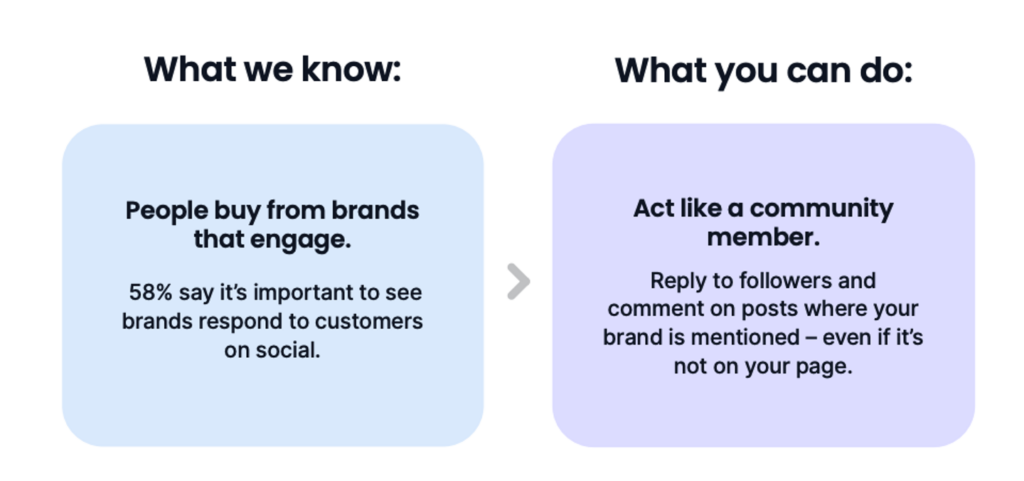
With the lightning-fast nature of social media, questions can come quickly, and shoppers expect fast answers. Otherwise, they may start to search elsewhere, which takes them out of the social commerce experience and potentially prevents a sale. According to survey data, 32% of customers expect a DM response within an hour of sending it.
A superior level of customer service support is likely to lead to more completed purchases and more repeat sales. By the same token, slow or inadequate support could prompt shoppers to leave and never come back.
The top channels for social commerce
The major social networking apps see social shopping as the future, and they are constantly competing to add more features and functionality. They generally provide merchants with similar core capabilities, including the ability to create shoppable content and deliver in-app buying experiences. Nonetheless, each channel offers a unique mix of tools and potential benefits for companies involved in social commerce.
So what are the powerhouses of social commerce today?
Facebook: the social commerce pioneer
Facebook remains a powerhouse in social commerce, leveraging its massive user base and sophisticated shopping tools. Facebook Shops enables merchants to create customized digital storefronts where customers can browse and purchase without leaving the platform. The integration with Meta’s commerce manager allows brands to manage inventory, track performance, and adjust strategies in real-time.
Live shopping has become increasingly popular on Facebook, with brands hosting interactive broadcasts that combine entertainment and commerce. Viewers can ask questions, see products in action, and make purchases during these streams, creating an engaging shopping experience that bridges the gap between online and offline retail.
Instagram: Visual commerce leader
Instagram has transformed from a photo-sharing app into a robust shopping destination, particularly appealing to fashion, beauty, and lifestyle brands.
The platform’s shopping features now include product tags in posts, Stories, and Reels, allowing brands to showcase items in authentic lifestyle contexts. Instagram’s algorithm favors shopping-related content, and 44% of users shop on the platform every week.
Instagram is currently the social commerce G.O.A.T. in terms of revenue, but TikTok is following quickly on its heels. Instagram’s commerce revenue is estimated at $37.2 billion in 2024. TikTok Shop revenue surged 650% to $33.2 billion in the same year.
TikTok: The fast-growing commerce platform
TikTok has quickly emerged as a leader in social commerce. Eleven percent of all U.S. households made a purchase on TikTok since the Shop was introduced. Roughly half of all TikTok users make a purchase there at least once a month.
TikTok’s short-form video format has proven particularly effective for product demonstrations and authentic brand storytelling. More than half of marketers using TikTok sell products or services through TikTok Shop, and over 398,000 U.S. merchants are selling on the platform.
The platform’s partnership with Shopify has streamlined the selling process, allowing merchants to manage their TikTok shop through familiar tools. The platform’s high engagement rate of 2.5% and its influence over Gen Z make it an essential channel for brands targeting younger audiences.
YouTube: The video commerce revolution
YouTube has evolved beyond its role as a content platform to become a significant player in social commerce. The platform’s shopping features now include shoppable ads that enable direct purchases that don’t interrupt the viewing experience.
YouTube’s Shopping Collections allow creators to showcase up to 30 products per channel, creating curated shopping experiences that feel natural within their content.
The platform’s AI-enhanced features provide personalized product recommendations based on viewing history and engagement patterns. This sophisticated targeting, combined with YouTube’s massive reach, makes it particularly effective for detailed product demonstrations, reviews, and tutorial content that drives purchase decisions.
One bonus for selling on YouTube is critical mass. YouTube consistently has the highest number of estimated Monthly Active Users (MAU): 2.5-3.9 billion, with Facebook second (2.1-3.06 billion MAU) and Instagram and TikTok with about half as many. Plus, users spend more than twice as much time on YouTube as they do on Instagram.
WhatsApp: Business messaging meets commerce
WhatsApp has introduced robust commerce features that transform business messaging into a complete shopping experience. The platform’s product messaging capabilities now include single- and multi-product showcases, allowing businesses to display up to 30 items in a single message.
Advanced cart functionality allows users to leave the app and return to their cart, retaining what they’ve already added, to reduce cart abandonment.
The platform’s integration with Facebook’s Commerce Manager enables real-time updates to product catalogs and inventory management. Recent updates include enhanced group chat features, improved video call quality, and document scanning capabilities, making it easier for businesses to provide comprehensive customer service alongside their commerce offerings.
Additional shopping platforms
While they are not comprehensive, other social platforms continue to develop their commerce capabilities. X has enhanced its conversational commerce features. Pinterest stands out with 85% of weekly U.S. Pinners making purchases based on Pins, while Snapchat leverages its AR technology for virtual try-ons, reaching 453 million users with innovative shopping experiences.
Final thoughts on social commerce
Looking ahead, social commerce will only continue to grow at a predicted average growth rate of 31% each year..
Expect to see more emerging platforms like Meta Quest, a VR shopping experience. And while growing X competitor Bluesky doesn’t yet have native shopping integrations, some experts are predicting that it could be the next major player in social commerce, with its decentralized and customizable nature as an advantage.
As AI enables more brands and platforms to scale quickly, it’s essential to keep an eye on where your ideal customers are flocking online. The best way to capture the power of social commerce is to meet your customers in spaces where they already love to hang out, and offer them seamless options to purchase that enhance, not detract from, their experience on social media.

